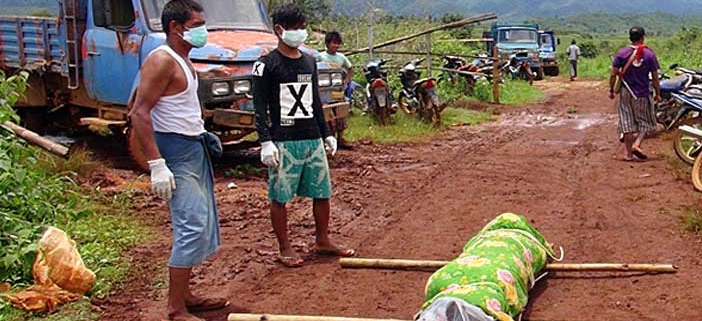Rights Group Calls on Myanmar Government to Try Soldiers in Civilian Courts
An international rights group called on the Myanmar government on Wednesday to try national army soldiers who killed five unarmed civilians in volatile northern Shan state last month in a civilian court to ensure justice for victims of human rights abuses by the armed forces.
A battalion of soldiers, who arrived in Yong Maw subtownship on June 25 looking for Shan rebel troops, shot dead five villagers during an interrogation near a cornfield where some of them were working and dumped their bodies in shallow graves.
They also deposited the bodies of two young men they shot who were passing through the area on motorbikes and failed to stop at a checkpoint.
The seven were from the Shan or Palaung (Ta’ang) ethnic minority groups who live in Shan state.
The military, in a rare admission of wrongdoing, said Wednesday that some of its soldiers had killed the five villagers, but did not take responsibility for the deaths of the other two men.
Lieutenant General Mya Tun Oo, Myanmar’s chief of military intelligence, told a press conference in the commercial capital Yangon that the army is investigating the cases of the seven deaths and will try the soldiers who killed the five civilians in a court martial.
In response, London-based Amnesty International issued a statement urging the national government to ensure the military is held accountable for human rights abuses and to make those who commit them stand trial in a civilian court.
“This case is an important reminder of the need to reform the military and judicial systems in Myanmar,” said Rafendi Djamin, director for South East Asia and the Pacific, in a statement.
“Although it is important that steps are taken to ensure those responsible for serious human rights violations are held to account, military tribunals are not the solution,” he said.
“The authorities in Myanmar must take immediate action to ensure that human rights violators can be effectively tried before independent, civilian courts—anything less would only serve to perpetuate the cycle of impunity,” he said.
Willing to cooperate
The killings come at a time when Myanmar’s powerful army has indicated a willingness to participate in the government’s peace conference in late August with various armed ethnic rebel groups.
Aung San Suu Kyi, the country’s de facto national leader, has made peace and national reconciliation a key goal of her civilian-led administration, which came to power in April.
The military and eight armed ethnic groups agreed to end hostilities in a nationwide cease-fire agreement signed last October under the previous army-backed government, though other rebel armies were excluded or refused to participate.
But rights groups believe that Myanmar’s military needs to undergo reform to keep in step with the country’s continued democratic development.
A military junta ruled Myanmar for five decades until 2011, and continues to control a quarter of the seats in parliament as well as three key defense and security ministries. It has also continued to engage in battles with armed ethnic rebels groups in Shan state and elsewhere.
Rights groups have accused both government troops and ethnic rebel soldiers of human rights violations in Shan state, including kidnapping, torturing, and killing civilians and forcing them to work as laborers.
Victims of human rights abuses perpetrated by the military are often fearful of speaking out.
“While it’s positive that the authorities are investigating this case, the reality is that all too often victims and their families are denied access to justice, truth and reparations, and have faced reprisals when reporting cases of military abuse,” Djamin said about the killings in Yong Maw.
“This has to stop and Myanmar’s new government must make it clear that no one is above the law,” he said.
Denying involvement
After villagers discovered the corpses on June 30, the government army denied any involvement, and the military-owned news outlet Myawaddy issued a report saying that the bodies belonged to Ta’ang National Liberation Army (TNLA) rebels.
The TNLA—one of the armed ethnic groups that still engages in clashes with the Myanmar army in Shan state—was excluded from signing the peace pact last October because of ongoing hostilities with the Myanmar army.
Fighting in the state between the national army and ethnic insurgents has displaced thousands of people.
Nevertheless, a Myanmar army deputy regional commander visited the families of the five victims in Mong Yaw in early July and gave each a “donation” of 300,000 kyat (U.S. $257).
The parents of the two brothers who were shot on their motorbikes have filed a missing persons report with police in Lashio township to start an official investigation of the incident.



